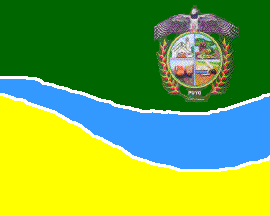
image by Ivan Sache, 8 March 2008

Last modified: 2014-05-17 by zoltán horváth
Keywords: pastaza | puyo |
Links: FOTW homepage |
search |
disclaimer and copyright |
write us |
mirrors

image by Ivan Sache, 8 March 2008
See also:
The town of Puyo (24,432 inhabitants in 2001), located on
river Puyo, is the capital of the Canton of Pastaza and of the
Province of Pastaza, Eastern Ecuador.
While the Province and the Canton of Pastaza have a flag, the
town of Puyo, until recently, had no flag.
The newspaper "Los
Andes" reports on 6 March 2008 that Puyo has now an
official flag and a coat of arms. The symbols, designed by Iván
Espín, were selected in a public contest. The Municipal Decree
prescribing the symbols made slight modifications to the original
designs, especially of the coat of arms, with the designer's
consent.
The flag, as shown in a colour drawing in "Los Andes",
is horizontally divided green-blue-yellow, with an unequal
(narrow along the hoist and wider along the fly) wavy white
fimbriation. The municipal coat of arms is placed in the upper
fly.
According to the Municipal Decree, the flag of Puyo has four
colours, green, white, blue and yellow. Green represents the
Amazonian exuberant vegetation; white represents the incomparable
fog covering the municipality; blue, as a wavy stripe, the river
that waters the town; and yellow, the richness of the soil.
The coat of arms is surrounded by a green (inner) and yellow
(outer) border and divided in four equal quarters. The elements
shown in the quarters are designed in a picturesque, non heraldic
manner. The upper left quarter shows the town cathedral, as the
symbol of the educative and misionary labour of the Dominican
fathers. The upper right quarter shows the majestuous river Puyo,
with in the foreground a still life representing the produced
wealth. The lower left quarter shows clay bowls
("mocawas") recalling the indigenous people who has
been living in Puyo until now. The lower right quarter shows
books, an ink bottle and a quill pen, symbolizing education, a
main tool of development of the town. A harpy eagle
(Harpia harpyja) surmonts the shield as emblematic of the
Amazonian fauna and venerated by several local ethnies. Two
heliconia (Heliconia sp.) panicles, representing the endemic
flora of Puyo, flank the shield; the name of the town is written
in white capital letters below the shield.
The image is based on images available on the "Los
Andes" website, keeping the 4:5 ratio from the source image.
Ivan Sache, 8 March 2008